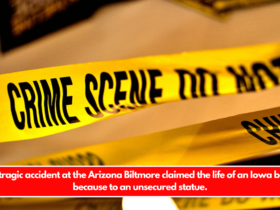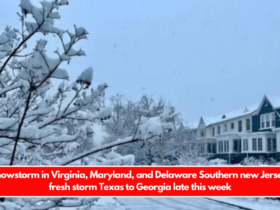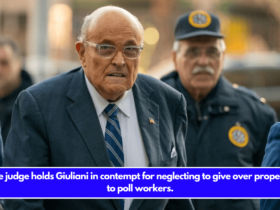President-elect Donald Trump has announced a broad plan to alter the way American elections are conducted.
“We need to get things straightened out in this country, including elections,” he said after accepting the “Patriot of the Year” award at a Fox Nation event in Long Island on Thursday.
Trump, 78, accepted the award, which was designed to resemble the American flag, following a live performance of Lee Greenwood’s “God Bless the USA” – the president-elect’s signature entrance song.
“We’re gonna do things that have been really needed for a long time,” he told the crowd. “And we’re going to look at elections. “We want paper ballots, one-day voting, voter ID, and proof of citizenship.”
He went on to criticise a recent California law that prevents local governments from requiring voters to show identification when casting their ballots at the polls. “In California, they just passed a law that makes it illegal to ask a voter for voter identification.
Think about that. It is illegal to ask a voter for their voter ID. “We’ll get the whole country straightened out,” he said.
It isn’t the first time Trump has proposed changing elections. During a speech in Johnstown, Pennsylvania, in August, he proposed getting rid of mail-in ballots in favor of same day voting and voter ID laws.
“We have to get back in and we want to change it all. We want to go to paper ballots. We want to go to same-day voting. We want to go to citizenship papers, and we want to go to voter ID. It’s very simple. We want to get rid of mail-in voting,” he said.
98% of US counties use paper ballots, according to the Brennan Centre. However, the Covid-19 pandemic has significantly changed the conduct of elections in the United States, leading to an unprecedented increase in early or mail-in voting.
Nationwide, voters cast 88,233,886 mail-in and early in-person votes in 2024, and 47 states now provide some form of early voting. Meanwhile, eight states have passed voter ID laws since 2020.
Trump has previously attempted to prohibit mail-in voting, with his campaign filing several lawsuits in 2020 to overturn many of the changes made by states to make it easier to vote by mail.
He also referred to mail-in ballots as “dangerous” and “corrupt,” claiming they would result in “massive electoral fraud” and a “rigged” 2020 election. He later blamed his loss in the 2020 election on mail-in ballots.
While there have been some isolated cases of election fraud as a result of postal voting, such as the 2018 North Carolina primary, which was rerun after a Republican candidate’s consultant tampered with absentee voting papers, the overall rate of voting fraud in the United States is less than 0.0009 percent.
According to a 2017 study by the Brennan Centre for Justice, external. “There’s simply no basis for the conspiracy theory that voting by mail causes fraud,” Federal Election Commission Chair Ellen Weintraub stated.
Trump, who had previously opposed mail-in voting, changed his stance this year and actively encouraged his supporters to cast their votes early. “I am telling everyone to vote early,” Trump said in an interview with Dan Bongino.
Meanwhile, in a series of virtual town halls and robocalls, Trump and daughter-in-law Lara Trump, the Republican National Committee’s co-chair, actively encouraged voters to use early voting options, such as mail-in ballots.
“Hi, this is Lara Trump calling on behalf of President Trump’s campaign, and we’re urging you to get out and vote before election day,” one robocall said, according to CNN. Earlier this year, Lara Trump made a robocall falsely claiming massive fraud in the 2020 election due to mail-in ballots.
The shift occurred as Trump sought to appeal to voters in seven battleground states, all of which he won.
However, returning to one-day voting would likely hurt rural voters, particularly in swing states with high rates of early voters, many of whom have previously supported Trump. It would also disproportionately affect disabled voters, whose turnout increased in 2020 due to mail-in voting.
Meanwhile, Trump’s plan to require “citizenship papers” and voter ID may disproportionately disenfranchise nonwhite people who do not have easy access to such paperwork. NPR reports that this group of voters is disproportionately nonwhite and identifies as independent or Democrat.
35 states required government-issued identification to vote in person in the 2024 presidential election. Of these, 24 required photo identification, such as a driver’s license or a United States passport. That is four more states than required for the 2020 election.















Leave a Reply